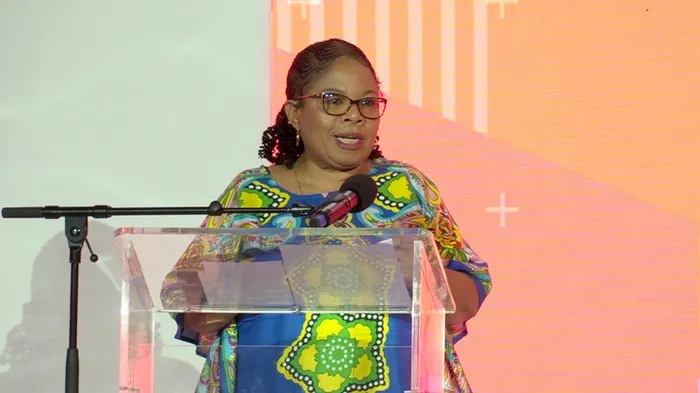
Deputy Minister of Tourism, Maggie Sotyu and TBCSA CEO, Tshifhiwa Tshivhengwa, listening to one of the speakers on the closing day at the Tourism Leadership Conference 2025 in Sun City, North West, on Friday.
Image: Supplied
Deputy Minister of Tourism, Maggie Sotyu, has called on industry leaders to ensure that South Africa’s tourism sector becomes a force for transformation, inclusivity and sustainable growth.
Speaking at the closing of the Tourism Business Council of South Africa (TBCSA) Leadership Conference at Sun City on Friday, Sotyu said the sector must be measured not only by international arrival figures but also by the opportunities it creates for communities across the country.
“Tourism is South Africa’s most human economy – one that depends not only on resources and infrastructure, but on people, stories, and shared experiences,” she said.
“Our nation’s tourism journey must also be measured in the jobs created for young people in rural communities and the opportunities extended to women entrepreneurs.”
Sotyu stressed that domestic tourism remained the backbone of resilience in times of global uncertainty, and urged the industry to design accessible and affordable experiences that encourage South Africans to explore their own country.
Highlighting South Africa’s global leadership role, Sotyu pointed to the recently concluded G20 Tourism Ministers’ Meeting and the adoption of the Mpumalanga Declaration, which sets out four priority areas to advance sustainable and inclusive growth in tourism.
She praised the TBCSA for its role in shaping the industry’s competitiveness and sustainability, noting that the organisation had positioned tourism as a “national asset” through advocacy, research and collaboration.
“As leaders, we must translate vision into action and ensure that the growth of tourism is inclusive, sustainable and transformative,” Sotyu said. “Tourism is not just about destinations – it is about shaping futures.”
The conference, which brought together government, business and community stakeholders, focused on innovation, digital transformation, destination development and strategies to make South Africa not only a world-class destination but also one that uplifts lives and drives inclusive economic growth.
TBCSA CEO Tshifhiwa Tshivhengwa presented the annual progress report to the industry on the actionables, achievements and status of the many previous Conference resolutions.
“Every year, we talk about what we have actioned. We don’t want the conference to be a talk shop. We must be accountable. It is important to come back and say what we have done,” Tshivhengwa said.
The tourism sector is one of the key drivers of South Africa’s national development, and a crucial contributor to inclusive economic growth, job creation, and global competitiveness.
In 2024, the tourism sector contributed R618.7 billion to the local economy, supporting 1.8 million jobs. This year, that number is forecast to rise to 1.9 million.
For the growth to be achieved and sustained, however, the sector needs the right enabling environment, solid infrastructure, smarter visa regimes, investment in skills, and aligned policy.
One of the consistent themes of the TBCSA Tourism Leadership Conference since its inception four years ago has been to find ways to ease South Africa's visa regimes, especially for visitors from key source markets.
Home Affairs Minister, Dr Leon Schreiber, unveiled the Electronic Travel Authorisation (ETA) - a platform for online visa applicants, capturing biometrics and receiving approvals in real-time, eliminating lengthy processing times and cumbersome documentation.
The launch of the ETA is seen as groundbreaking as it is designed to ensure seamless arrivals through automated biometric checks and minimal queuing, enhancing both traveller experience and national security.
“The ETA is set to eliminate visa barriers that have suppressed South Africa's tourism potential for many years, while simultaneously revolutionising the security of our immigration processes,” Schrieber said.
“Instead of long queues, paper forms and inefficiency, from now on, the first impression that tourists will get of South Africa will be when they apply online for an ETA – showcasing a country with an immigration system that is rapidly modernising, embracing innovation, and blazing a trail towards becoming a world leader in digital transformation.”
BUSINESS REPORT